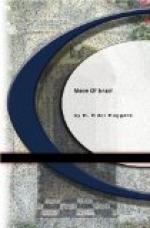After the days of embalmment were accomplished the body of Pharaoh Meneptah was carried up the Nile to be laid in his eternal house, the splendid tomb that he had made ready for himself in the Valley of Dead Kings at Thebes. To this great ceremony the Prince Seti was not bidden, lest, as Bakenkhonsu told me afterwards, his presence should cause some rising in his favour, with or without his will. For this reason also the dead god, as he was named, was not suffered to rest at Memphis on his last journey up the Nile. Disguised as a man of the people the Prince watched his father’s body pass in the funeral barge guarded by shaven, white-robed priests, the centre of a splendid procession. In front went other barges filled with soldiers and officers of state, behind came the new Pharaoh and all the great ones of Egypt, while the sounds of lamentation floated far over the face of the waters. They appeared, they passed, they disappeared, and when they had vanished Seti wept a little, for in his own fashion he loved his father.
“Of what use is it to be a king and named half-divine, Ana,” he said to me, “seeing that the end of such gods as these is the same as that of the beggar at the gate?”
“This, Prince,” I answered, “that a king can do more good than a beggar while the breath is in his nostrils, and leave behind him a great example to others.”
“Or more harm, Ana. Also the beggar can leave a great example, that of patience in affliction. Still, if I were sure that I should do nothing but good, then perhaps I would be a king. But I have noted that those who desire to do the most good often work the greatest harm.”
“Which, if followed out, would be an argument for wishing to do evil, Prince.”
“Not so,” he answered, “because good triumphs at the last. For good is truth and truth rules earth and heaven.”
“Then it is clear, Prince, that you should seek to be a king.”
“I will remember the argument, Ana, if ever time brings me an opportunity unstained by blood,” he answered.
When the obsequies of Pharaoh were finished, Amenmeses returned to Tanis, and there was crowned as Pharaoh. I attended this great ceremony, bearing coronation gifts of certain royal ornaments which the Prince sent to Pharaoh, saying it was not fit that he, as a private person, should wear them any longer. These I presented to Pharaoh, who took them doubtfully, declaring that he did not understand the Prince Seti’s mind and actions.
“They hide no snare, O Pharaoh,” I said. “As you rejoice in the glory that the gods have sent you, so the Prince my master rejoices in the rest and peace which the gods have given him, asking no more.”
“It may be so, Scribe, but I find this so strange a thing, that sometimes I fear lest the rich flowers of this glory of mine should hide some deadly snake, whereof the Prince knows, if he did not set it there.”
“I cannot say, O Pharaoh, but without doubt, although he could work no guile, the Prince is not as are other men. His mind is both wide and deep.”




